Selecting the best pipe for underground water line is a crucial decision that directly affects the efficiency, longevity, and cost-effectiveness of a water distribution system. Whether for residential, municipal, or industrial water pipe applications, choosing the right material ensures that the system can withstand various pressures, environmental conditions, and long-term wear. A poorly chosen water line pipe can lead to frequent maintenance, higher costs, and potential system failures.
Construction projects, whether residential, municipal, or industrial, require careful selection of underground water line materials to ensure long-term performance and compliance with building standards.
Introduction to Pipe Selection
When planning an underground water supply system, the choice of pipe material is one of the most important decisions you’ll make. The right pipe not only ensures a reliable flow of water but also protects the system from leaks, corrosion, and costly repairs down the line. With options like PVC pipe, HDPE pipe, and PEX tubing available, understanding the strengths and limitations of each material is essential for building water lines that stand the test of time.
Selecting the best pipe for underground water lines means considering how each material will perform under the unique conditions of your property. Factors such as soil type, water pressure, and the expected lifespan of the system all play a role in determining which pipe is best suited for your needs. By making an informed choice, you can ensure that your water lines deliver consistent quality and durability, whether you’re installing a new water line for a home, barn, or commercial property.
Understanding the Importance of Choosing the Right Pipe
The material you choose for your underground water lines can make the difference between a system that lasts for decades and one that requires frequent repairs. Using the wrong pipe can lead to leaks, corrosion, and even contamination of your water supply. For example, HDPE pipe is highly valued for its durability and resistance to corrosion, making it a reliable option for underground installations where soil conditions and water pressure can vary. PEX tubing, on the other hand, is known for its flexibility and ability to withstand freezing temperatures, making it ideal for regions with harsh winters.
It’s important to match the pipe material to the specific challenges of your site. Soil composition, water pressure, and the risk of freezing all influence how well a pipe will perform. By carefully considering these factors, you can prevent leaks and ensure that your water lines remain strong and dependable for years to come.
Key Factors to Consider Before You Begin
Before you break ground on your underground water line project, take the time to evaluate the key factors that will influence your choice of pipe. Durability is paramount—your pipe must be able to withstand the pressure of the soil above, resist corrosion from minerals in the ground, and handle fluctuations in water pressure. The material should also be compatible with your local water quality to prevent any negative impact on taste or safety.
Cost and installation method are also important considerations. While PVC pipe is often more affordable upfront, it may require more fittings and joints, which can increase the risk of leaks if not properly installed. HDPE pipe, though more expensive, offers superior resistance to corrosion and can be installed with fewer joints, reducing potential weak points. Using stainless clamps and protective measures can further enhance the durability of your water line, especially in areas with rocks or shifting soil.
By weighing these factors—durability, resistance to corrosion, compatibility with soil and water quality, and installation requirements—you can select a pipe material that offers the best balance of performance and value for your underground water lines.
Potable Water Requirements
When installing underground water lines intended for drinking water, it’s essential to choose materials that are certified safe for potable water use. Not all pipes are created equal—some materials, like PEX tubing, are specifically designed to maintain water quality and resist corrosion and scaling, making them a top choice for potable water systems. However, it’s crucial to verify that any PEX tubing or other pipe material you select is certified for potable water and meets all local and national standards.
The safety of your water line depends not only on the pipe itself but also on the quality of the fittings, joints, and installation practices. Using high-quality, certified fittings and ensuring proper installation techniques will help prevent leaks and contamination with dirt. Industry experts and well-known members of the plumbing community recommend always following manufacturer guidelines and local codes to ensure your underground water lines deliver clean, safe water.
It’s also important to distinguish between materials intended for potable water and those used for non-potable applications. For example, black poly pipe is commonly used for irrigation or other non-drinking water systems but is not suitable for potable water lines. By selecting the right pipe material and ensuring all components are approved for drinking water, you can protect your water quality and the health of everyone who relies on your water line.
When selecting the best pipe for underground water line, several key factors should be carefully considered:
Material Selection
The material of the water line pipe significantly impacts its performance and lifespan. Different materials, such as PVC, copper, PEX, HDPE, and ductile iron, offer unique benefits and drawbacks. Some pipes are highly resistant to corrosion, while others are more flexible or better suited for high-pressure applications. Durability and resistance to chemicals or extreme conditions are particularly important for industrial water pipe systems. However, some materials like PVC may raise concerns about chemicals that can leach into the water supply, especially in potable water applications.
Durability and Longevity
Underground conditions can be harsh, and factors like soil pressure, moisture exposure, and fluctuating temperatures can affect the pipe’s durability once buried. The best pipe for an underground water line must resist corrosion, withstand ground movement (especially important when sand is present), and endure extreme temperatures without cracking or degrading. Protection is crucial for underground water lines to guard against environmental threats such as moisture, soil movement, and temperature extremes. Flexible pipes like PEX and HDPE are fine if not ideal for areas with shifting soil, while rigid materials like PVC and ductile iron are better suited for stable conditions.
Cost Considerations
The cost of the best pipe for underground water line is not just about the initial installation; long-term maintenance and replacement expenses should also be factored in. While some pipes, such as PVC, offer a lower upfront cost, others, like copper and HDPE, provide long-term savings due to their extended lifespan and minimal maintenance requirements.
By carefully considering these factors, homeowners, contractors, and engineers can select the most efficient, durable, and cost-effective water line pipe for their specific needs. Below, we explore the most commonly used pipe materials and their advantages and limitations.
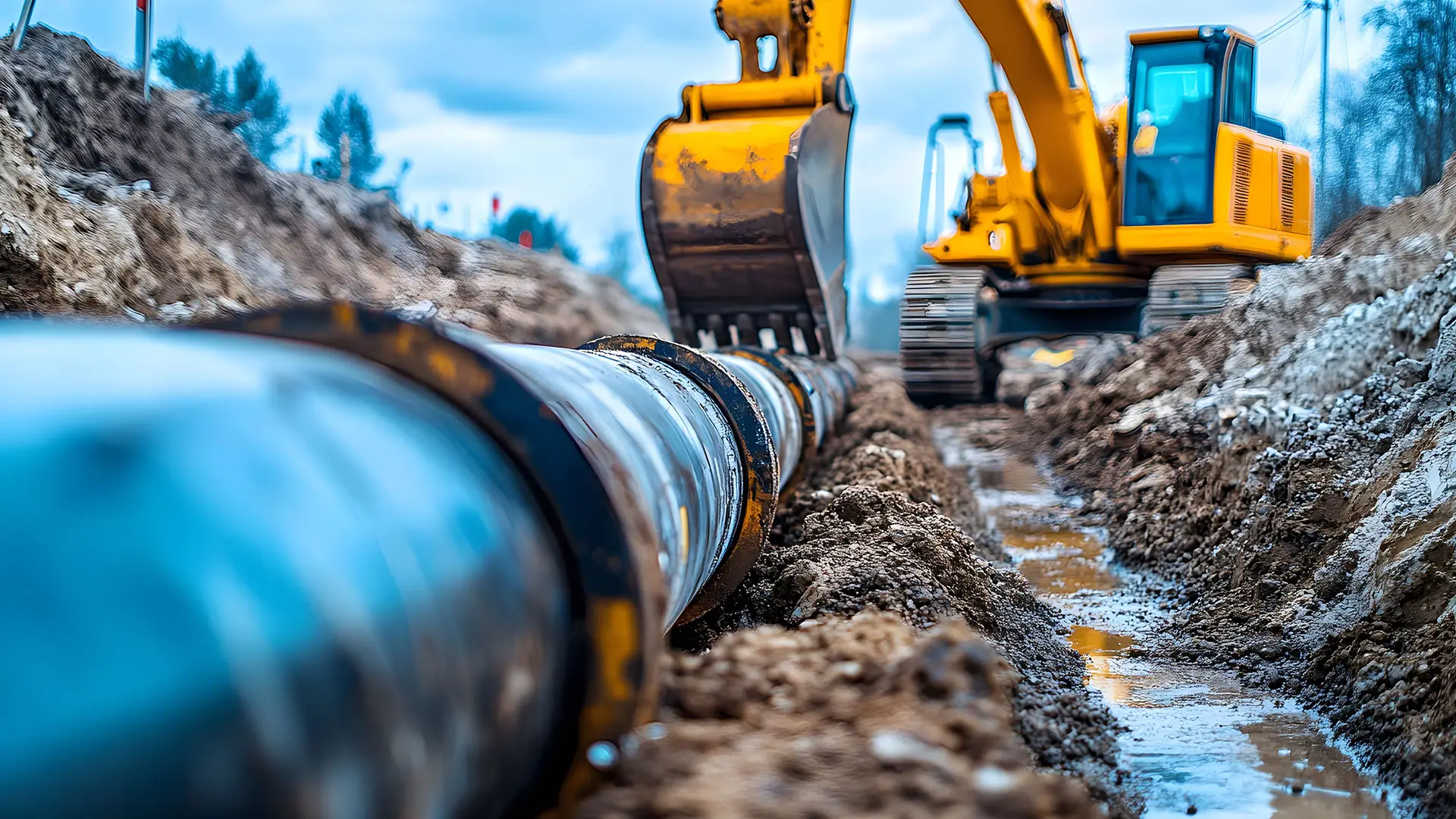
Common Pipe Materials for Underground Water Lines
Selecting the best pipe for underground water line requires understanding the different materials available and how they perform under specific conditions. Various factors, such as durability, corrosion resistance, cost, and ease of installation, play a role in determining the ideal water line pipe for a project. Installation methods, such as traditional trench excavation or trenchless techniques, can also influence the choice of pipe material for underground water lines, as different methods may have specific installation requirements. Below are the most commonly used materials for underground water systems, along with their benefits and limitations.
PVC (Polyvinyl Chloride) Pipes
PVC is one of the most widely used materials for underground piping due to its affordability and resistance to corrosion.
Advantages:
- Corrosion-resistant: Unlike metal pipes, PVC does not rust or degrade over time.
- Lightweight: Easy to transport and install compared to heavier materials.
- Cost-effective: One of the most affordable options, making it a popular choice for residential projects.
Limitations:
- Brittle in freezing temperatures: PVC can crack in extreme cold, making it less ideal for regions with harsh winters.
- Not suitable for high-pressure applications: While durable, it may not be the best pipe for underground water lines involving extreme pressure.
Copper Pipes
Copper has been a preferred material for decades due to its reliability and long lifespan.
Advantages:
- Long lifespan: Can last over 50 years with proper maintenance.
- Corrosion-resistant: Unlike steel, copper withstands acidic conditions.
- Durable: Resistant to damage from external forces.
Limitations:
- Expensive: One of the costliest materials available.
- Prone to theft: Due to its high value, copper pipes are often targeted for theft.
- May require soldering: Installation is more complex, increasing labor costs.
PEX (Cross-linked Polyethylene) Pipes
PEX is a flexible plastic pipe commonly used in both residential and commercial water systems.
Advantages:
- Flexible: Can bend around obstacles, reducing the need for fittings.
- Resistant to freezing: Expands slightly when frozen, reducing the risk of bursting.
- Easy installation: Requires minimal tools and labor.
Pex underground piping is specifically designed for outdoor and underground applications, offering insulation and durability for water supply lines. Insulated PEX underground piping is often used to transfer hot water from outdoor boilers to various locations, including providing heating to a garage.
Limitations:
- Not UV-resistant: It cannot be exposed to sunlight, making it unsuitable for above-ground applications.
- Requires additional fittings: Long runs may need extra connectors, increasing costs.
HDPE (High-Density Polyethylene) Pipes
HDPE is an excellent choice for industrial water pipe applications due to its durability and flexibility.
Advantages:
- Highly flexible: Can withstand ground movement without cracking, making it one of the best pipe for underground water line options.
- Corrosion-resistant: Does not rust or degrade over time.
- Long lifespan: Can last 50-100 years, reducing long-term maintenance needs.
Limitations:
- Higher initial cost: More expensive than PVC but offers better durability.
- Requires specialized fusion welding: Installation involves heat fusion, which requires skilled labor. HDPE pipes are connected using specialized fusion techniques, resulting in seamless, leak-free joints that enhance the longevity and reliability of underground water lines.
Ductile Iron Pipes
Ductile iron is widely used in municipal and industrial water pipe systems due to its high strength and pressure capacity.
Advantages:
- Strong and durable: Can handle high-pressure and heavy loads, making it ideal for high-demand applications.
- Suitable for municipal and industrial applications: Commonly used in major water distribution networks.
Limitations:
- Heavy: Requires machinery for installation, increasing labor and equipment costs.
- Expensive: High material and labor costs make it less suitable for small-scale projects.
- Requires protective coatings: To prevent corrosion, ductile iron pipes need special linings.
When selecting the best pipe for underground water line, durability, cost, and installation requirements must be considered. Understanding each material’s strengths and weaknesses ensures a more reliable and long-lasting underground water system, whether for residential, municipal, or industrial applications.
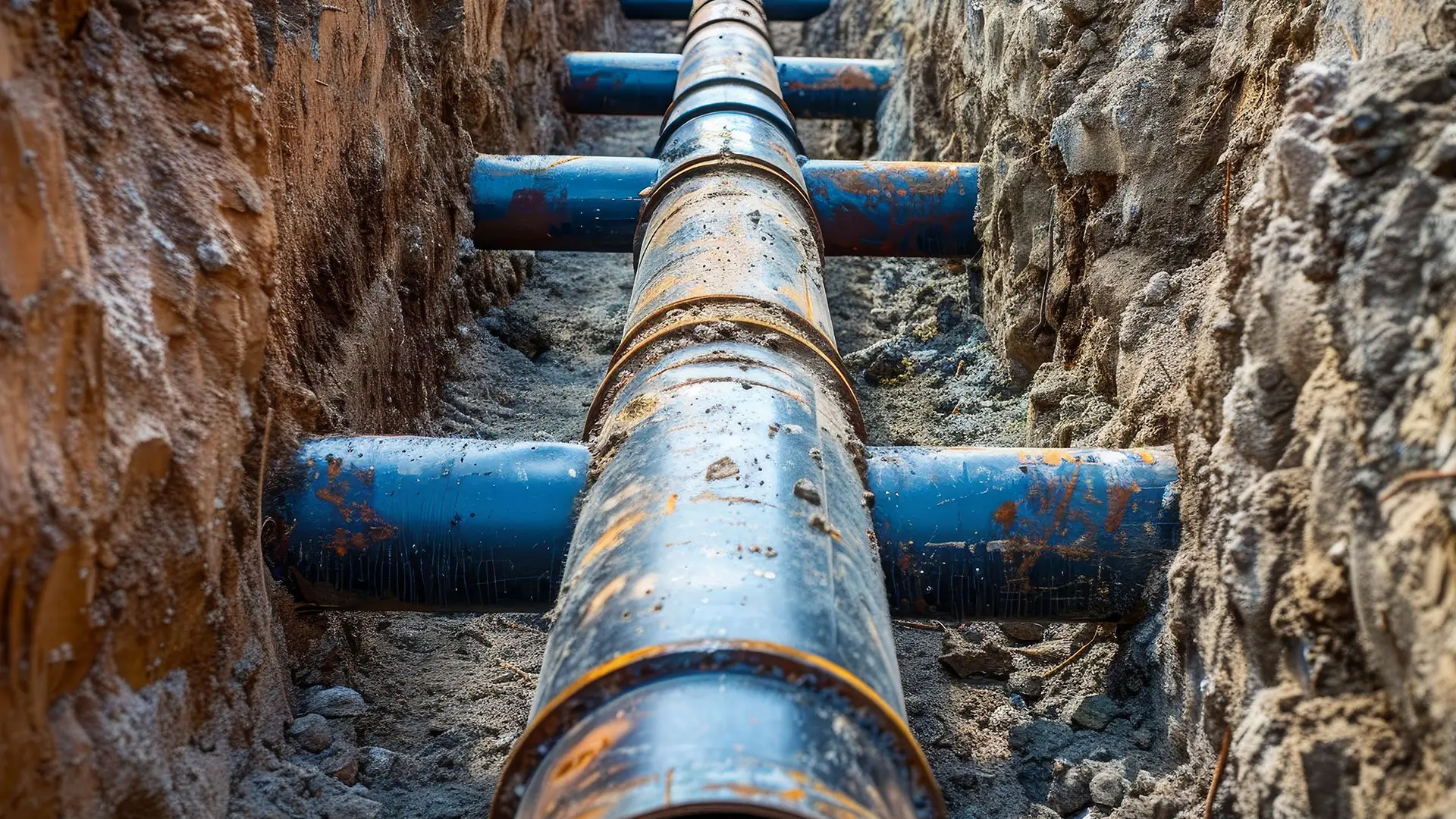
Durability Considerations for Underground Water Lines
Selecting a durable water line pipe is crucial for ensuring long service life, reducing maintenance costs, and preventing failures. The best pipe for underground water line must be able to withstand environmental stressors such as corrosion, big rocks, soil movement, water pressure, and temperature fluctuations. Choosing materials that resist corrosion and leaking is essential for maintaining reliable underground water delivery. Below are key durability factors to consider when choosing a pipe material.
Resistance to Corrosion and Chemical Exposure
One of the biggest threats to underground pipes is corrosion, which can weaken the structure over time. Some materials, such as PVC and HDPE, are naturally resistant to corrosion, making them ideal for long-term underground use. On the other hand, metals like ductile iron and copper require protective coatings to prevent rusting and degradation. In areas where the water supply contains high levels of minerals or chemicals, it is essential to select the best pipe for underground water line that offers high resistance to chemical exposure. Industrial water pipe systems, in particular, must be designed to handle harsh conditions without corroding, as they frequently carry waste.
Longevity and Maintenance Requirements
- Copper and ductile iron have long lifespans but require occasional maintenance to prevent rust and leaks.
- HDPE and PEX require minimal maintenance and can last several decades, making them a cost-effective choice.
- PVC has a long lifespan but may become brittle over time, particularly in areas with fluctuating temperatures.
For the best pipe for underground water line, choosing a material with minimal maintenance requirements can reduce long-term expenses and increase reliability.
Performance Under Varying Soil Conditions and Water Pressure
The type of soil and pressure conditions play a significant role in selecting the right water line pipe:
- Rocky or shifting soils: HDPE and PEX are excellent choices due to their flexibility, allowing them to move without breaking.
- Stable soil conditions: PVC and copper perform well in areas with minimal ground movement.
- High-pressure applications: Ductile iron and HDPE are the best pipe for underground water line when dealing with extreme water pressure, as they can withstand significant stress without failing.
Impact of Freezing and Thawing Cycles
Temperature fluctuations and freezing conditions can cause underground pipes to expand and contract.
- PEX is the best pipe for underground water line in freezing climates due to its flexibility, allowing it to expand without bursting.
- PVC and copper are more prone to cracking if the water inside them freezes.
- HDPE provides good resistance to freezing but must be installed below the frost line to prevent damage.
For systems designed to transfer hot water, such as outdoor boilers or radiant heating, it is important to select underground water lines that can withstand high temperatures without degrading.
For industrial water pipe applications, ensuring resistance to extreme temperatures is essential to prevent system failures and costly repairs.
By considering these durability factors, property owners and engineers can select a water line pipe that offers longevity, resilience, and cost-effectiveness.
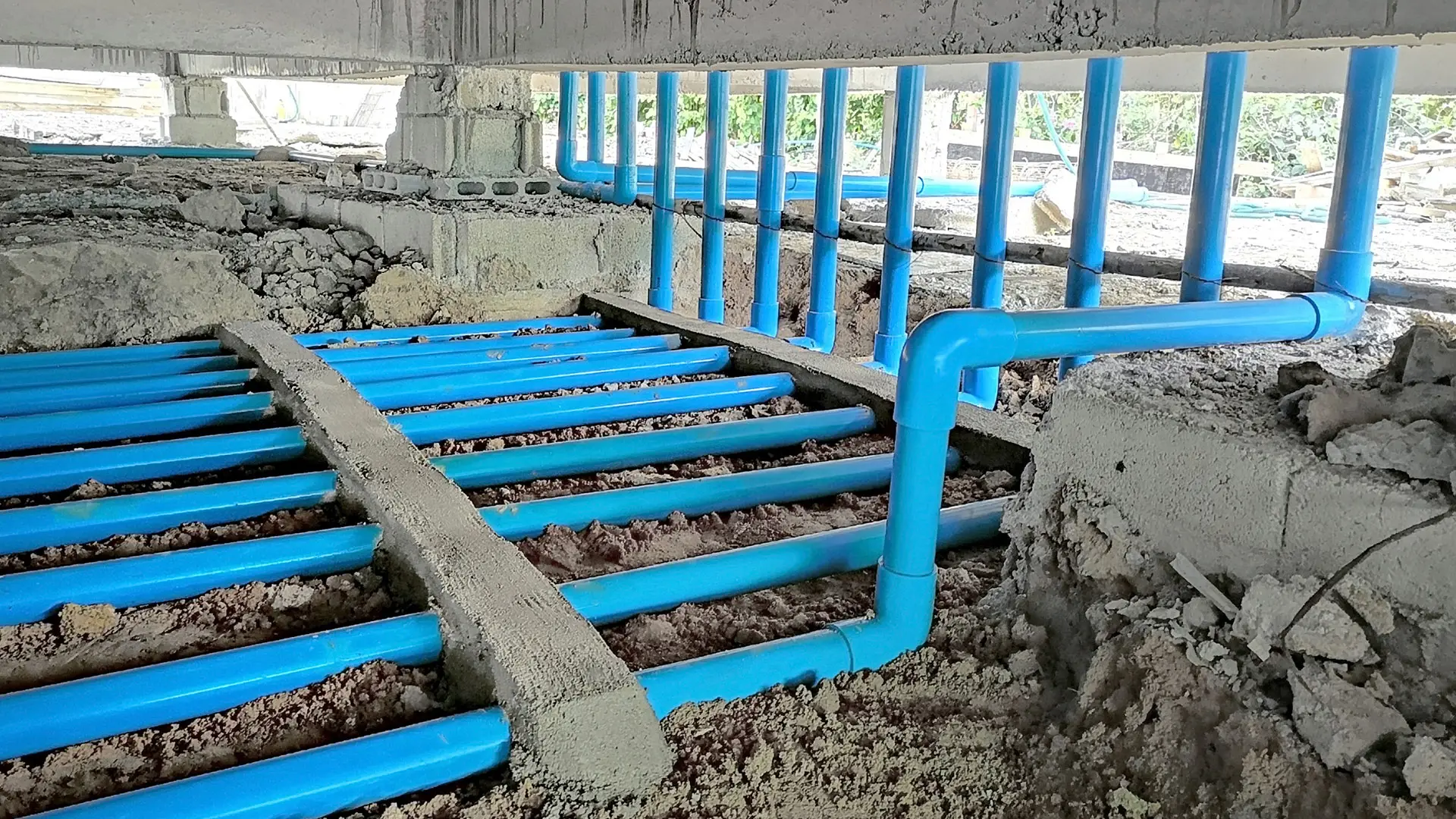
Cost Considerations for Underground Water Pipes
Cost is a crucial factor when selecting the best pipe for underground water line. While some materials may have a lower upfront cost, they may require more frequent maintenance, leading to higher long-term expenses. A balance between initial investment and long-term savings is essential when choosing the right water line pipe for residential well water, municipal, or industrial water pipe applications.
Initial Material and Installation Costs
The upfront cost of the best pipe for underground water line depends on the material and installation complexity:
- PVC and PEX are the most budget-friendly options, making them ideal for residential applications.
- Copper and HDPE have moderate costs but offer long-term durability, reducing replacement expenses.
- Ductile iron has the highest initial cost due to its weight and the need for specialized installation. It is often used in large-scale municipal and industrial water pipe systems.
Long-Term Maintenance and Replacement Expenses
While some pipes have a lower initial cost, their maintenance and replacement requirements should be considered:
- PEX and HDPE require minimal maintenance, making them cost-effective over time.
- PVC is affordable initially but may need replacement sooner in high-pressure or freezing environments.
- Copper and ductile iron last for decades but may require periodic repairs due to corrosion or joint failures.
Labor and Equipment Requirements for Installation
Installation costs vary depending on the material:
- PVC and PEX are easy to install with basic tools, making them ideal for small projects.
- HDPE and ductile iron require specialized equipment and skilled labor, increasing installation costs but offering durability for large-scale applications.
Cost-Effectiveness Based on Project Size and Application
- Small residential projects: PVC and PEX are the best pipe for underground water line due to affordability and ease of installation.
- Municipal water distribution: HDPE and ductile iron provide long-term value despite higher initial costs.
- Agricultural irrigation: PVC and HDPE balance cost and performance, making them efficient choices.
By evaluating these cost factors, homeowners and engineers can select the best pipe for underground water line that aligns with budget, durability, and long-term efficiency.
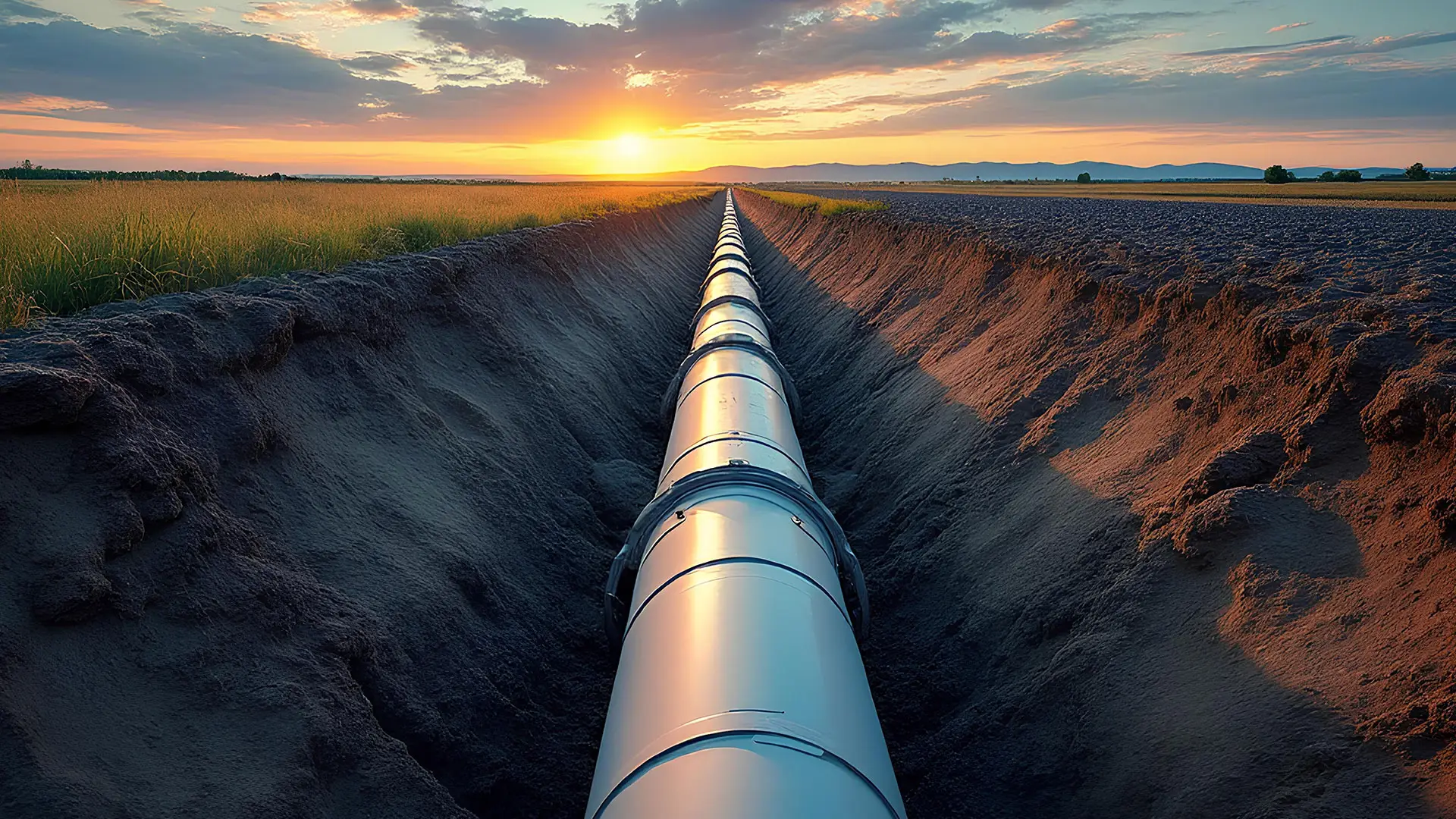
Best Pipe Selection Based on Application
Choosing the best pipe for underground water line depends on the specific application, environmental conditions, and budget. Each type of water line pipe has its advantages, making it important to match the right material to the intended use.
Residential Water Supply Lines
- PEX is an excellent choice for homes due to its flexibility and resistance to freezing, reducing the risk of pipe bursts in colder climates.
- PVC is a budget-friendly alternative for areas with mild temperatures, offering durability and affordability for underground water systems.
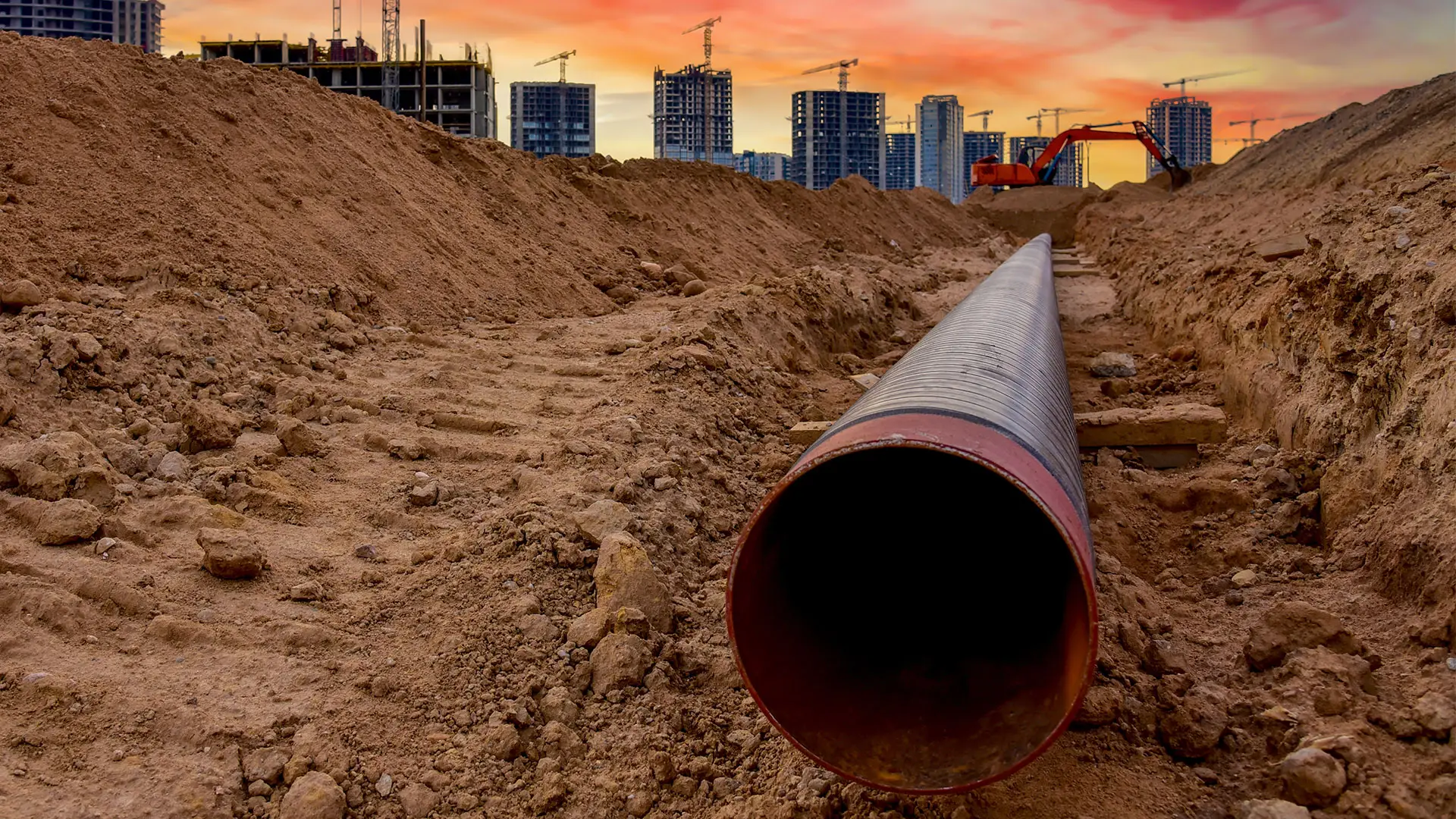
Municipal and Industrial Water Distribution
- HDPE is highly durable and corrosion-resistant, making it an ideal option for municipal infrastructure and large-scale industrial water pipe systems.
- Ductile iron is well-suited for high-pressure applications, providing strength and longevity for municipal water supply networks.
Irrigation and Agricultural Applications
- PVC is widely used in irrigation systems due to its low cost and ease of installation.
- HDPE is preferable for large-scale agricultural projects as it withstands soil movement and extreme conditions.
High-Pressure and High-Temperature Applications
- Ductile iron is the best pipe for underground water line when dealing with extreme pressure and temperature fluctuations.
- Copper offers excellent heat resistance but comes at a higher cost.
Selecting the right pipe ensures long-term efficiency, reliability, and cost-effectiveness in any application.
Conclusion
Choosing the best pipe for underground water line requires a thorough evaluation of material, durability, and cost. The right selection ensures a long-lasting, efficient water system that minimizes maintenance expenses. PVC and PEX are cost-effective choices for residential use, providing affordability and ease of installation. For municipal and industrial water pipe applications, HDPE and ductile iron offer superior durability, making them ideal for high-pressure and large-scale systems.
When selecting a water line pipe, several factors should be considered:
- Environmental conditions and soil type: Pipes should be chosen based on their ability to withstand underground pressure, moisture exposure, and temperature fluctuations.
- Long-term maintenance and replacement costs: Investing in a high-quality pipe reduces the risk of leaks, corrosion, and costly repairs.
- Balancing upfront costs with longevity: While some materials have higher initial costs, they provide long-term savings through durability and minimal maintenance.
Consulting with professionals ensures compliance with local regulations and the selection of the best pipe for underground water line for a specific application. By investing in the right material, homeowners and businesses can prevent expensive repairs and ensure long-term system efficiency.

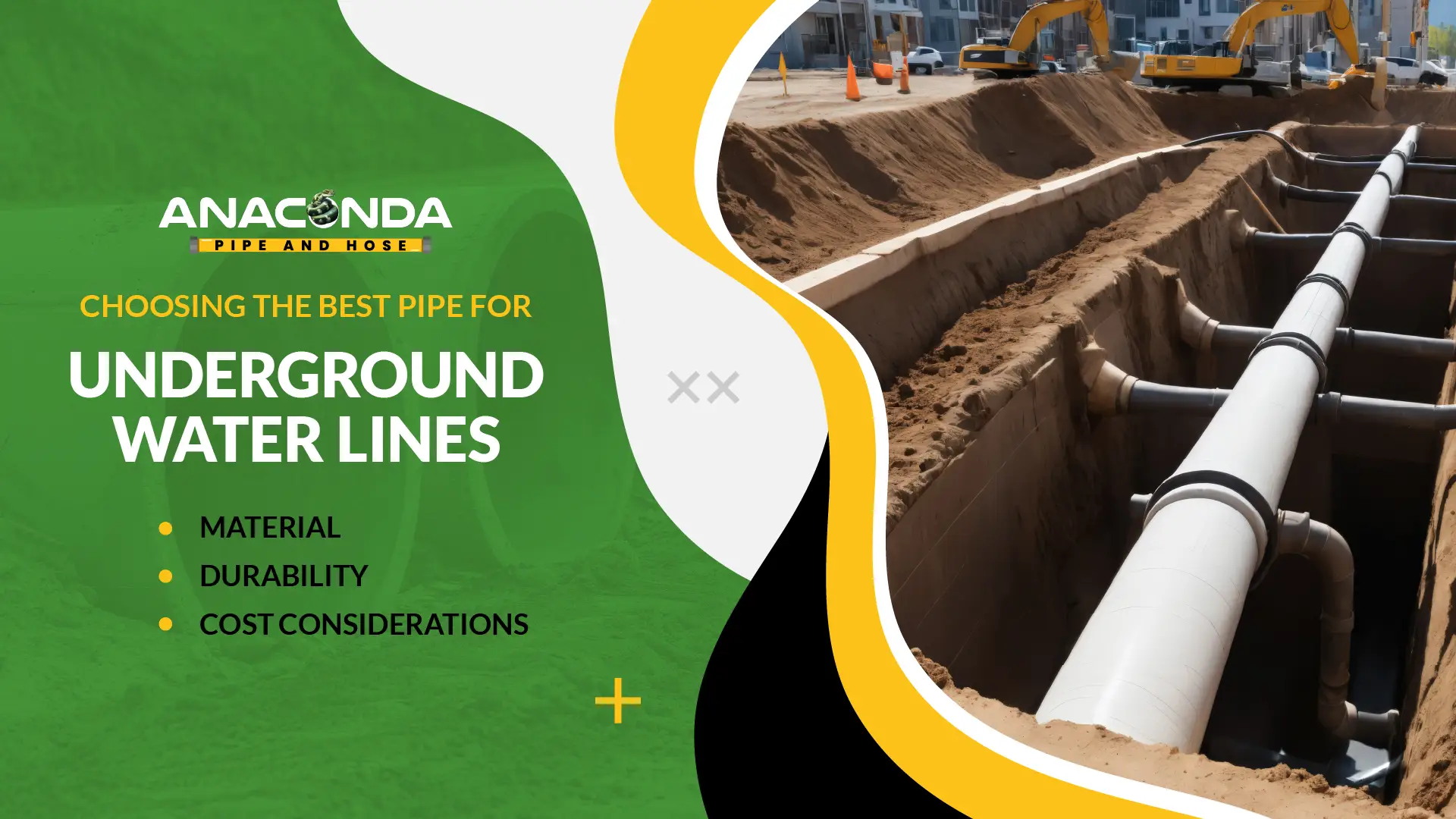
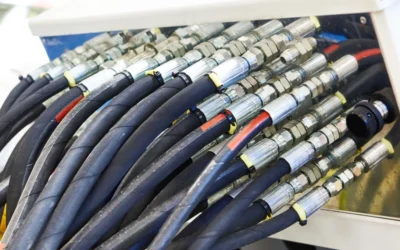

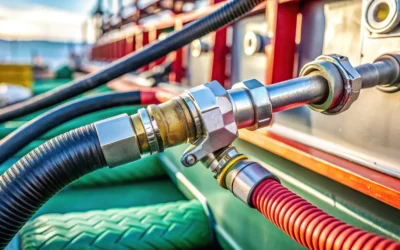
0 Comments